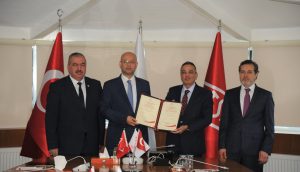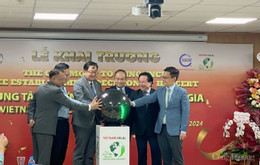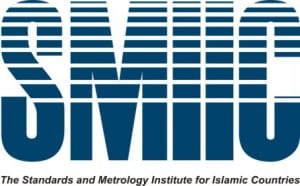Speaking about the increasing importance of standards, auditing and quality in terms of the international trade of halal products, Economy Minister Nihat Zeybekci said that halal certification of products demanded by the world’s 1.8 billion Muslims has yet to be completed on a global scale.
Minister Zeybekci pointed out that no consensus has been reached in the Islamic world regarding the documentation of certified halal products, adding that the various practices and requirements in Islamic countries that differ on the matter have prevented the development of trade for halal products.
Recalling that in 2010 Turkey took important steps within the framework of the Organization of Islamic Cooperation (OIC) regarding halal certification, Minister Zeybekci said that regulations including the Halal Food Standard and the Halal Accreditation Standard were approved by the OIC, leading to the establishment of the Standards and Metrology Institute for Islamic Countries (SMIIC) headquartered in Turkey. The economy minister also indicated that the number of members in this international organization has risen to 36.
Stressing that the halal accreditation system is of great importance in terms of establishing the basis for trust in products with halal certificates and mutual recognition of the documentation as well as the halal standard, he noted that Turkey needs an organization to strengthen its central position on halal certification and accreditation in this context.
Underlining that HAK will strengthen Turkey’s central position in the field of halal certification and accreditation and allow Turkey to be a gold standard in terms of rule-making and steps to be taken moving forward, Zeybekci said that in today’s market, there is high potential for the halal food trade, which is worth about $1.2 trillion globally and is increasing yearly, pointing out that halal products include non-consumable goods such as cosmetics in addition to pharmaceutical products and many others, pushing the potential of global trade in halal products to $3.9 trillion.
“Turkey is the largest production center among Islamic countries in halal products. For this reason, we have to take maximum advantage of the global halal product market. We aim for Turkey to determine the trends and consumption habits of Islamic countries in the coming period by examining the cultural traditions of our geographic area,” Zeybekci continued. “For this reason, we will not remain indifferent to the potential of $3.9 trillion in the halal product market, and we will be the pioneer in this regard.”
Meanwhile, the World Halal Fair will take place from Nov. 23-25 in cooperation with the Turkish Standards Institute (TSE), the SMIIC and Discover Events. The fair will be held simultaneously with the 33rd Standing Committee for Economic and Commercial Cooperation of the Organization of the Islamic Cooperation (COMCEC) Ministers’ Meeting in Istanbul on Nov. 20-23. Ministers from the 57 OIC countries are expected to attend the fair.




